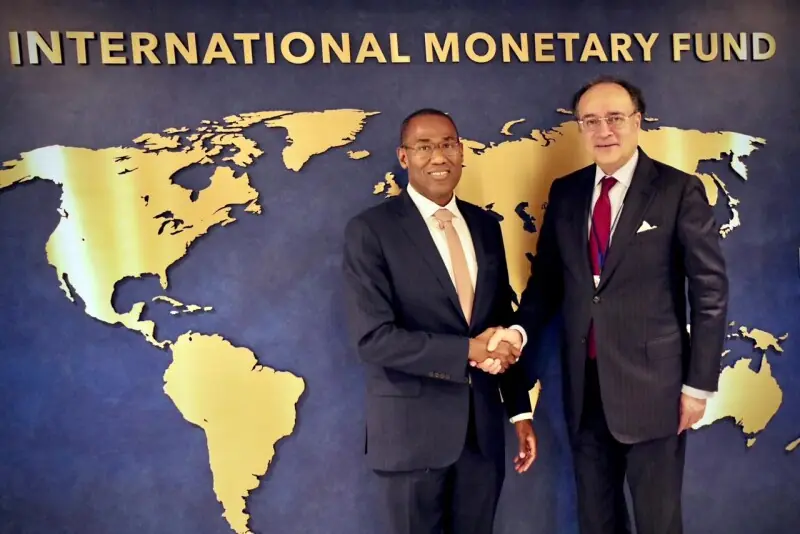Finance Minister Muhammad Aurangzeb held a constructive meeting with Nigel Clarke, Deputy Managing Director of the International Monetary Fund (IMF), during the ongoing IMF-World Bank Annual Meetings.
During the meeting, the finance minister reaffirmed Pakistan’s commitment to maintaining macroeconomic stability and advancing structural reforms, read a statement released by the Finance Division on Wednesday.
Aurangzeb acknowledged the IMF’s appreciation of Pakistan’s programme performance and reaffirmed the government’s resolve to sustain the trajectory of stability and reform.
“He thanked the IMF for its support in the second review of the Extended Fund Facility (EFF) and the first review of the Resilience and Sustainability Facility (RSF), expressing hope for an early staff-level agreement (SLA).
“He also acknowledged and conveyed gratitude for the IMF’s condolences over recent flood-related losses.”
Following the meeting, the IMF and the Pakistani authorities reached a staff-level agreement on the second review under Pakistan’s 37-month EFF and the first review under the 28-month RSF.
“The staff-level agreement is subject to approval by the IMF Executive Board. Upon approval, Pakistan will have access to about $1.0 billion (SDR 760 million) under the EFF and about $200 million (SDR 154 million) under the RSF, bringing total disbursements under the two arrangements to about $3.3 billion,” read a statement released by the IMF on Wednesday, following the conclusion of discussions with the Pakistani authorities.
Meanwhile, Aurangzeb continued his high-level engagements on the second day of the IMF-World Bank Annual Meetings, holding a series of pivotal meetings with officials from the US government, the World Bank, the Saudi Fund for Development (SFD), and leading international investors.
The finance minister held a productive meeting with Emory Cox, Special Assistant to the US President for International Economic Relations; Ricky Gill, Senior Director for South & Central Asian Affairs; and Pierre Yared, Acting Chair of the Council of Economic Advisors at the White House.
Recalling his recent interactions with US Commerce Secretary Howard Lutnick and USTR Ambassador Sarah Greer in July, the finance minister emphasised the need to translate the emerging consensus on trade into a broader economic partnership.
“Discussions focused on leveraging investment opportunities in energy, minerals, agriculture, technology/IT, and digital assets,” read the statement.
Aurangzeb also met H.E. Sultan Abdulrahman Al-Marshad, CEO of the Saudi Fund for Development (SFD), where he reaffirmed the strategic partnership between Pakistan and the Kingdom of Saudi Arabia.
He thanked the SFD for the Saudi Oil Facility and sought further collaboration on key infrastructure projects, including the Hyderabad–Sukkur Motorway (M-6), Main Line-1 (ML-I), skills development, and IT infrastructure. He welcomed the SFD’s assurance of support for Pakistan’s digitalisation agenda.
In his address at the G-24 Ministers & Governors’ Meeting, the finance minister highlighted the macroeconomic stability achieved by Pakistan, which is underpinned by structural reforms in taxation, energy, and state-owned enterprises (SOEs). He also emphasized the importance of regional trade corridors and global cooperation on climate change.
Aurangzeb also engaged leading institutional investors at a roundtable hosted by Jefferies International.
He briefed participants on Pakistan’s economic outlook, fiscal and monetary developments, external sector dynamics, and ongoing IMF engagement. He outlined major reforms in taxation, energy, and privatization, as well as the Government’s tariff policy for boosting exports.
In a separate meeting with Ousmane Dione, Regional Vice President for MENAAP at the World Bank, Aurangzeb reaffirmed the government’s commitment to the effective implementation of the newly launched Country Partnership Framework (CPF).
He informed that a comprehensive implementation plan had been developed with full buy-in from provincial governments. He stressed the need to optimise Pakistan’s access to available IDA windows and requested support for a long-term flood mitigation program under the CPF to strengthen climate resilience.
In a key meeting with Ahmed Abdelaal, Group Chief Executive Officer of Mashreq Bank, and its senior management, the finance minister celebrated the long-standing partnership between Pakistan and the globally acclaimed financial institution.
The finance minister expressed confidence that Mashreq’s formal entry into the Pakistani market will serve as a catalyst, strengthening the country’s financial ecosystem and driving innovation.
He extended congratulations to the management on the bank’s successful commercial launch and reaffirmed the government’s unwavering commitment to fostering a supportive policy environment for the long-term growth and success of Pakistan’s financial sector.


